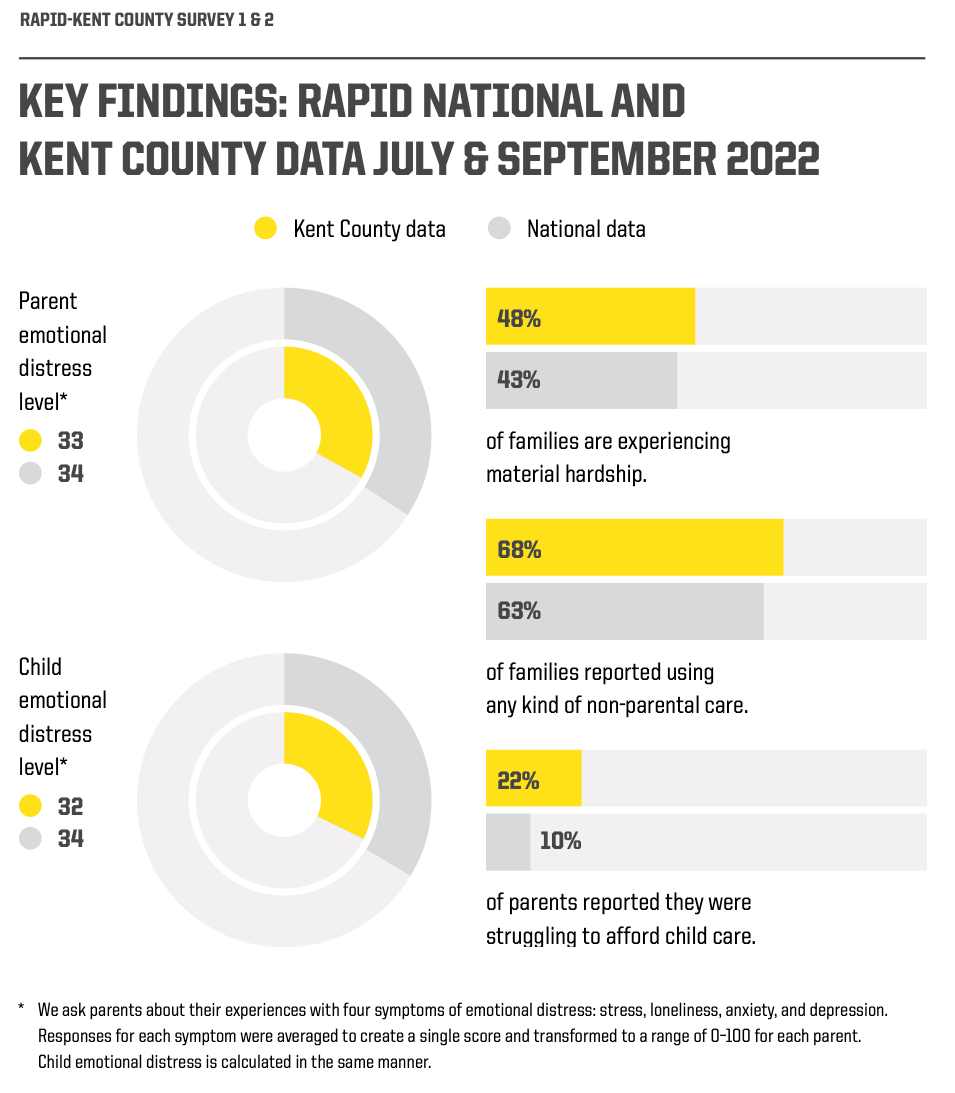Since the early weeks of the pandemic, advocates and policymakers have relied on RAPID’s survey results for up-to-the-minute snapshots of America’s families with young children. RAPID stands for The Rapid Assessment of Pandemic Impact on Development project. The RAPID survey prioritizes actionable data on child, parent and caregiver well-being, material hardship, health care and child care, which it shares via clear and graphically appealing posts.
Stanford University professor Philip Fisher leads RAPID, and a National Advisory Council chaired by Joan Lombardi guides the initiative.
👉 Read more: For Young Children, a RAPID Response to the Pandemic
Its latest project, Community Voices, has the RAPID team zeroing in on community-based surveys in Chicago, several counties across Michigan, in Dallas and Harris County, Texas, and in California. RAPID and community-based organizations are co-creating survey questions, partnering with trusted organizations to connect the survey to parents and to share the findings.
The voices of parents and caregivers are so central to the project that, for all intents and purposes, they are leading it. “Community leaders were approaching us, looking for data for their counties, cities or states. They share a demand for what RAPID’s been doing nationally: gathering parent voices and timely, ongoing information about families’ experiences,” says Cristi Carman, RAPID’s director. RAPID is now adapting their survey and process to meet that demand.
Nara Topp, program officer, W.K. Kellogg Foundation, says, “It is important for communities to have access to timely data that allows them to identify problems and craft their own solutions to achieve lasting, transformational change for children. The RAPID survey is a tool designed to provide this insight, which is especially needed as communities and families continue to feel the effects of the pandemic. At the Kellogg Foundation, we strongly believe in the power of listening to communities most affected by a problem to shape the solutions.”
Tuning the Instrument
Megan Streng of First Steps Kent in Kent County, Mich., says that her organization originally attempted to launch a survey of its own. “We started doing our own parent listening sessions, but we just weren’t getting the response we wanted. RAPID was offering exactly what we wanted to hear from parents, and it was already working.” The partnership has generated five rounds of surveys, with more than 2,000 responses from parents, from demographic categories broadly representative of the county.
When you’re approaching community members, Streng notes, trust is your most valuable asset, and she appreciated the way RAPID followed the guidance of local parent leader Anthony Queen. “We planned on 15-minute surveys,” she recalls, “and he told us, ‘Well, that’s too long,’ so we shortened it to five minutes and made sure that the first touch was just providing information.” A welcome page on First Steps’ website describes the project for community members, and detailed and engaging follow-up emails show participants that their voices have been heard and how the local picture compares to the national.
👉 Listen to an interview with parent leader Anthony Queen
First Steps Kent’s president Jennifer Headley-Nordman, who started after the collaboration launched, says that the county-specific information will help ensure that funding generated through the Ready by Five Millage is distributed where it will have the greatest impact. It will also support efforts to renew the millage in 2024. “County commissioners repeatedly ask us, ‘What is the return on investment?’ This is one of the ways we show we’re being responsible as the administrator of the millage, making sure that we have an accountable process with robust quality indicators,” she says.
Further, the RAPID data is more personal and granular than the U.S. Census Bureau’s American Community Survey statistics—exploring, for example, the economic choices families are making about whether to sign children up for extracurricular activities.
👉 Read more: The Next Steps for First Steps Kent
“Stanford’s diverse and knowledgeable team meshed well with who we are as an organization and a community,” Headley-Nordman says. “They’re always wanting to be reflective, especially when it comes to parent participation and how they can improve the process, improve the instrument.”
Trusted Networks
Alan Cohen, president and CEO of Dallas’s Child Poverty Action Lab (CPAL), describes his organization as the research and development laboratory for the city’s safety net for children. Data has untapped potential for economic mobility, he says, and that’s why he approached RAPID about participating in Community Voices.
“It’s a tool for narrowing down the problem statement,” he says. “We already know many of the structural issues that exist, but there are many local issues that still need to be uncovered.” Cohen says that Dallas has its fair share of “professional advocates” who regularly show up at public meetings, and he praises their outspokenness and commitment, but it’s the experience of everyday residents that leads to solutions. For example, upon identifying an administrative logjam at WIC clinics, CPAL began working with the program staff to whittle down the time it takes a mom to apply for receiving benefits from three hours to closer to 30 minutes.
RAPID has been extremely helpful, he adds, at identifying which community organizations families have the ear of Dallas families. “Those are the trusted networks we need to activate,” he says.
Bearing Witness
In her previous roles with the City and County of San Francisco, Abigail Stewart-Kahn led efforts to serve families with children and people without housing. “I became an admirer of RAPID and used the national data to inform the City’s policies and plans,” she says, “As a social worker and policy maker, I never again wanted to be in the position of making decisions that had significant impacts on my fellow community members without a mechanism to quickly, directly and equitably listen to those community members.” She ended up joining the team and now serves as managing director of the Stanford Center on Early Childhood (which administers RAPID).
Throughout her career, Stewart-Kahn explains, she has been consumed with the question of “How do we bear witness and listen to the community, and pull researchers and policymakers closer together to actually start doing things for kids? As a clinical social worker, I know the greatest assets are my clients’ and families’ own solutions, and I have been striving to figure out what that looks like at scale: the communities’ own solutions and experiences driving policy.”
It starts with data, but it doesn’t end there. “When I worked in government, I loved data and we know it’s a critical pathway to equity, but not all governments have the staffing capacity to look at actual spreadsheets and run the numbers. We need somebody to help us translate.” That’s what RAPID does so effectively.
“Community leaders want to hear about and understand the dynamic circumstances and needs of the families they are serving,” Carman adds. RAPID is a tool to help them listen and use that data to inform and drive action.
RAPID will take a new step this summer when it launches a Learning Network to connect Community Voices sites to one another, facilitating shared learning among partnering communities across the country. “We’re in the early stages of this community-based work,” Carman notes, but RAPID is learning, building and refining their approach in collaboration with their partners.
👉 Read more: Listening to Families, Collecting the Evidence to Support Change
Beyond the families and children who stand to benefit, the survey process could have an additional perk—reinforcing and rebuilding parents’ trust in the systems they interact with. “If you listen to community and respond,” she says, they’ll start to trust again.”
It’s a lofty ambition, but don’t underestimate RAPID as it enters its fourth year.

Mark Swartz
Mark Swartz writes about efforts to improve early care and education as well as developments in the U.S. care economy. He lives in Maryland.




